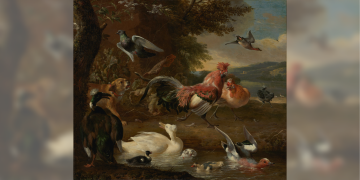DISCLAIMER: The following only represents the views of the author and does not reflect the views of Island ECC.
—
(Continued from Part 3)
I am always in awe of God’s perfect timing. To be more specific, I am especially in awe of the way He has of piecing all things together like perfect puzzle parts. We only notice it after the fact, retracing the lines He has drawn on the ceiling of our lives. How it all fits! Our eyes sparkle as they dart between convergence points wherever these threads appear to ‘cut back into each other’. It often reminds me of the red-stringed investigation boards I associate with detective work, where every line pinned over various maps and photographs eventually leads back to one central figure. (Everything points back to the Lord!) I have had many such realizations lately. Only yesterday, a friend of mine reached out to share her experience of exactly what is described above; what’s more, her occurrences revolved around two specific words: ‘repentance’ and ‘righteousness’—two words at the core of what I was about to begin writing on when she called. Needless to say, we both came away feeling overcome by His sovereignty and grace. Our connection to our God, to His Creations (including to each other as a unified body of believers), and to His purpose are the driving force of our lives, one that calls us to holiness.
“Therefore, as God’s chosen people, holy and dearly loved, clothe yourselves with compassion, kindness, humility, gentleness and patience.” (Colossians 3.12 NIV)
‘Tzadiks’ (righteous people) were seen as God’s hands and feet. Because they worked for the common good and were good stewards of the resources granted them, when they prospered, the entire city shouted for joy (Proverbs 11.10), knowing that they would each be blessed by this. Such is our Christian call to holiness. In the New Testament, we learn that we are made righteous through grace by faith. Our very first act of righteousness is accomplished when we become Christians and are made anew. Paul’s words in Galatians 5.13 evoke three important aspects of our faith: the free will God has granted us, that our New Nature is directed by love, and that we should seek to see the desires of the Spirit triumph over those of the flesh, for It dwells in us to help us bear Its fruit. As we abide in Christ, our attributes are transformed (Galatians 5.22-23), our essence redefined, and because we have been made His righteous chosen people, sin is no longer our master. We are at once set free and called to seek holiness amidst the unholy—to strive to live according to our New Nature and follow Him wholeheartedly, rebuking evil as far as we can. [1] Often, our ability to discern what is holy and unholy requires both our full attention and continued petitions for wisdom. While God’s Holiness encompasses a pure and perfect expression of righteousness, we remain works in progress, looking toward the disciplines of discipleship as we seek to align our hearts with His.
“For by one sacrifice he has made perfect forever those who are being made holy.” (Hebrews 10.14 NIV)
As a chosen people headed for the promised land (Proverbs 21.21), our righteous attempts to dispense grace require humility (deny ourselves), perspective (God is sovereign), and vision (He is coming). Of course, the idea of self-denial in a culture that idolizes self-reliance (control) and the pursuit of desires of the flesh goes against the grain … but our Christian faith has always done so. How could it not? We answer to and serve God, rather than the status quo. Our biblical vision of the world should drive us away from the flock of unbelievers by causing us to live and act differently, should it not? Christians have long been persecuted for their counter-cultural faith; the teachings of Jesus were radical and revolutionary! What if they inspired us to wrestle with the world?
As a chosen people headed for the promised land (Proverbs 21.21), our righteous attempts to dispense grace require humility (deny ourselves), perspective (God is sovereign), and vision (He is coming).
“Do not conform to the pattern of this world, but be transformed by the renewing of your mind. Then you will be able to test and approve what God’s will is—his good, pleasing and perfect will.” (Romans 12.2 NIV)
In Mark 10, Jesus denounces the way things are done. He calls for faithfulness in marriage, citing the divorce ‘allowance’ of Moses’ Law as a concession, a response to hardened hearts that did not reflect the intention (ideal) of God. Divorce, slavery, flesh-eating … none of these represent God’s intention for us, yet all have been allowed, lawfully practiced, and culturally accepted at some point or another in history, or continue to be to this day. But what God wants for us is always in alignment with His loving nature and faithfulness—and love fulfills the Law (Romans 13.8). Many situations in Scripture have involved events that did not match pre-fall ideals [2], and veganism is not the free pass to righteousness some may believe it is. What truly matters is our heart, and what flows from it. There is no holiness pyramid scheme that could affect your hardwired worth as a child of God. As said in Matthew 15.11 (and encompassed in Galatians 5.6), no food is unclean or valuable in itself, nor can it defile a person—“the only thing that counts is faith expressing itself through love.”
… veganism is not the free pass to righteousness some may believe it is. What truly matters is our heart, and what flows from it.
“Dear friends, let us love one another, for love comes from God. Everyone who loves has been born of God and knows God. Whoever does not love does not know God, because God is love.” (1 John 4.7-8 NIV)
Although our flawed nature prevents us from being perfect, I believe that we should persist in aiming high, striving to align our faith with our deeds, and our hearts with His, as James instructs in verses 2.14-25. I hope to improve my understanding of theology far beyond its budding state in order to better serve Him. All I know for now is that I am passionate about living out my daily life for the glory of God and His Creation through a lifestyle that favors loving kindness. Christian veganism is a manner of worship. Today, too few people think of the church as ‘vegan-friendly’ (let alone pause to consider adopting the practice of a Kingdom-driven vegan faith), even when abstinence from animal-flesh in the name of Christian love, mercy, and compassion has never been more needed—this for all of God’s Creation, not least of all our fellow men. Rather than allow gluttony or sloth or pride to mislead us into sacrificing God’s Creatures and Creation to the idol of our bellies, we can pray for His will to be done on earth and for our hearts to soften in the spirit of repentance, so that in light of our New Nature, our hearts may overcome our appetites.
All I know for now is that I am passionate about living out my daily life for the glory of God and His Creation through a lifestyle that favors loving kindness. Christian veganism is a manner of worship.
“So whoever knows the right thing to do and fails to do it, for him it is sin.” (James 4.17 ESV)
Addendum: Concepts of righteousness, justice, and mercy so often come together in Scripture because they speak to God’s loving nature. While the health benefits that come with following the diet [3] humans were designed for—as per God’s Eden ideal—are enough to attract non-believers to the same merciful lifestyle (Daniel 1.12-15), our practice of veganism seeks to reduce suffering (avoidable human, animal, and ecological suffering), and should be grounded in the values of our faith. From John Wesley to Billy Graham, and even top Christian athlete + seven-time F1 World Champion Lewis Hamilton, many influential Christians practice(d) veganism. After all, followers of Christ were long reputed to prefer a virtuous and sacrificial life that sought to do no harm, one that chose self-denial over indulgence of the senses, and mercy over cruelty, as pleases God. [4] [5]
——
[1] On what dedicating our entire selves to God’s Kingdom requires of us, Nicky Gumbel writes: “Be disciplined, uncompromising […] and radical about sin. It is often sin that leads to division. Jesus calls us to be ruthless about living a life of holiness. […] ‘every detail of our lives is affected by the presence of this holy God.’ You are called to holiness in every aspect of your day-to-day life.”
[2] In His perfect wisdom, God allows what is best for the greater good at any given time. In many instances, this has involved the deaths of people and of animals. After the fall, with Divine knowledge of the bigger picture, God clothed Adam and Eve in skins and chose to allow the consumption and sacrifice of animals. In the case of Cain and Abel, God even accepts an animal sacrifice over a plant offering. (Although Nicky Gumbel points out in his study of Numbers that “Jesus is the one perfect sacrifice. The decreasing number of bulls sacrificed each day [Numbers 29], from thirteen, to seven, to one, points ahead to a time where no sacrifice would be needed any longer. Jesus, the one perfect sacrifice, abolished the need for any further sacrifices.”) I feel that we should not let our lack of understanding deter us from striving to align our hearts with His, or from making the choices that best seem to reflect God’s goodness and loving nature.
[3] Ideally, a Whole Foods Plant-Based Vegan diet, also sometimes nicknamed “the (Garden of) Eden diet.”
[4] Some may cite figures dating back to pre-Constantine church fathers, as well as more recent cloisters and monasteries. Even today, some Christian churches (e.g: Creation Care Church and the Live Mercifully Ministry) are fully dedicated to Christian vegan living.
[5] • “Thanks be to God! Since the time I gave up the use of flesh-meats and wine, I have been delivered from all physical ills.” — John Wesley, founder of Methodism
• “It is far better to be happy than to have your bodies act as graveyards for animals. Accordingly, the apostle Matthew partook of seeds, nuts and vegetables, without flesh.” — St. Clement of Alexandria
——
Continue reading: Part 5
CONCLUSION (Kingdom Calling) — on Christian Vision. “How You Treat God’s Creation is How You Treat God.”
——
Further Reading:
Damien’s CHRISTIAN VEGAN GUIDE































































